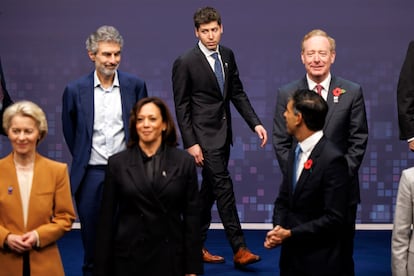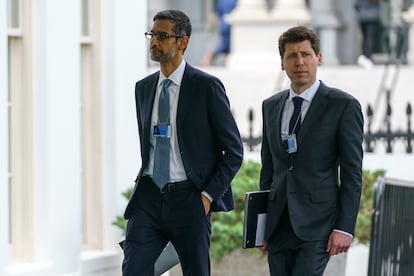Why everyone is fighting over Sam Altman, the prodigal son of Silicon Valley
The OpenAI CEO, who has been fired, hired by Microsoft and reinstated with enhanced powers all in less than a week, champions the artificial intelligence revolution

First came Bill Gates, Steve Jobs and Mark Zuckerberg, some put Elon Musk next and many believe it is now Sam Altman’s turn. The chosen one to be the face of Silicon Valley, the tech genius who is setting the pace for the others. Aged 38, Altman is the standard-bearer of the artificial intelligence (AI) revolution. In just 12 months, since he launched ChatGPT, he has prompted the big technology companies to hastily change their priorities and focus on this new technology. Last week’s turmoil at OpenAI gives us an idea of how highly valued Mr. Altman is. First, the shareholders’ meeting declared that it had lost confidence in him and decided to dismiss him last Friday. On Monday, he was hired by Microsoft, which owns 49% of OpenAI, and that same day 95% of the staff threatened to leave if he was not reinstated. On Tuesday, the young executive returned to his post as CEO of OpenAI and promptly fired those who had ousted him. He returned with reinforced powers and with the explicit support of Microsoft’s senior management.
But what is the new star of the San Francisco scene like? First and foremost, he’s no newcomer to the California jet set. In 2014, at the age of 29, Altman became the president of Y Combinator, the now iconic startup incubator from which companies like Airbnb, Dropbox and Twitch have emerged. A year later, he was tasked with running OpenAI, a startup that aimed to challenge Google for its outright leadership in AI development. He was selected for the position by Elon Musk, the then fashionable entrepreneur behind Tesla and SpaceX, and Peter Thiel, an early investor in Facebook and founder of Palantir Technologies. His relationship with Thiel remains healthy. However, his relationship with Musk has gone pear-shaped. The owner of X walked away from OpenAI, sent a letter calling for a six-month moratorium on AI research and, in the meantime, developed his own project, xAI, with which he presented Grok, his alternative to ChatGPT, a few weeks ago.
❤️🫡❤️ https://t.co/n1x47m5bTZ
— Sam Altman (@sama) November 22, 2023
Conceived as a research laboratory, OpenAI focused heavily on the transformer model, a specific machine learning architecture designed by Google scientists on which all the large language models (LLMs) are based. They invested some $1 billion to implement more and more computing power and scale the model. The results arrived last year, when they launched the Dall-E2 image generator and their blockbuster product: ChatGPT, the conversational bot that has moved AI into the public conversation. It can write poetry, summarize texts, suggest medical prescriptions or pass medical exams, all in a matter of seconds.
It still makes glaring mistakes (so-called ‘hallucinations’) and makes things up, but it indicates the path forward for AI. ChatGPT is the most successful application of all time. It surpassed 100 million unique users within two months of its launch. It took Facebook four years to reach those figures, and nine months for TikTok. Altman has ensured that OpenAI is now valued at around $90 billion.
ChatGPT is not the first tool of its kind (Google already ran some models in the experimental phase), but it is the one that has been made available to the general public the earliest. Altman was the one who decided to offer it openly, something that Google had decided against, believing that the flaws of these large models are not yet sufficiently fine-tuned. It was this blend of boldness and lack of caution in handling AI that apparently led a section of OpenAI’s board to force Altman’s dismissal. Indeed, some media outlets claim that, just before the termination, a group of workers warned the board of directors of a powerful discovery in the field of AI with the potential to “threaten humanity,” although it is not clear that this impacted the decision to oust the executive.
Altman firmly believes that technology will enhance social welfare. He has devoted part of his fortune to financing two techno-futuristic dreams: to achieve an unlimited source of energy and to extend life expectancy. He invested some €355 million in Helion Energy, the startup seeking to make nuclear fusion viable, and another €170 million in Retro Biosciences, which is researching ways to extend life. “I took all my liquid wealth and invested it in these two companies,” he told MIT Technology Review magazine. He has said on more than one occasion that money is not his priority (and that he had no salary at OpenAI), although he has never revealed how much his wealth amounts to. He is one of the few Silicon Valley gurus who does not appear in the Forbes rankings. He is known to retain several stakes in startups from his time at Y Combinator, including Stripe and Airbnb.

And what does he do in his free time? “Well, I like racing cars,” he told The New Yorker. He owns five sports cars, including two McLarens and an old Tesla. “I like flying rented planes all over California. Oh, and one odd one — I prep for survival.” He is preparing for when the world collapses. “I try not to think about it too much, But I have guns, gold, potassium iodide, antibiotics, batteries, water, gas masks and a big patch of land in Big Sur (California) I can fly to.”
Born in Chicago, but raised in middle America (St. Louis, Missouri), Altman studied for two years at Stanford University before dropping out to launch his first startup: Loopt, a mobile app for geolocating friends, which he sold for $43 million in 2012. He had shown early promise as a child. At the age of eight he was already disassembling and assembling his Macintosh. Computers were his refuge. “I grew up in the Midwest, sort of struggling with being gay, and I didn’t have anyone I could talk to about that,” he revealed to The New Yorker. “Sam is not particularly religious, but he is culturally very Jewish — an optimist yet a survivalist, with a sense that things can always go deeply wrong,” Peter Thiel said about Altman.
Magnetism and leadership
The fact that 738 of OpenAI’s 770 employees threatened to leave the company if Altman did not return speaks volumes about his popularity among his subordinates. They believe he has an unwavering determination in his goal, which is also his personal obsession: to develop a general artificial intelligence (one that will equal or surpass human intelligence). He believes he can accomplish that mission at OpenAI.
“Sam is extremely good at becoming powerful,” was how Paul Graham, co-founder of Y Combinator and one of Silicon Valley’s leading figures, described him. “No one in the world is better than Sam at dealing with this kind of situation,” he tweeted on Sunday, when neither his move to Microsoft nor his return to OpenAI had yet been announced. His faith in the young man remains intact, since in 2008 he wrote in his blog: “You could parachute him into an island full of cannibals and come back in five years and he’d be the king.”
Altman likes to be in control. And, as his former collaborators tell The Washington Post, he tends to put his personal interests ahead of those of the organization. This was the case with Y Combinator, which he used as a platform to learn about startups in which to invest with a fund that he and his brother manage. That tendency to serve his own interests may have been the catalyst for his mentor Graham’s decision to fire him from Y Combinator after handing over the controls of the incubator to him for five years when Altman was still in his twenties.
Fully aware of the status he has acquired in recent times, a few months ago Altman embarked on a tour with government leaders, including Spanish Prime Minister Pedro Sanchez and his French counterpart Macron, to warn of the dangers of AI. He attended the meeting organized by the White House with top tech names to discuss the state of AI and has launched his own open letter warning of the dangers. “My worst fear is that we, the technology industry, cause significant harm to the world. If this technology goes wrong, it can go quite wrong,” he said on Capitol Hill at a hearing on AI.
However, OpenAI is still in the race to lead this technological revolution, which is poised to make significant breakthroughs in the coming years. There might be many top executives in Silicon Valley, but only a few make it into the pantheon. Gates made computers a consumer item. Jobs ushered in the era of smartphones; Zuckerberg did the same for social networking. Will Altman prevail as the pioneer of AI?
Sign up for our weekly newsletter to get more English-language news coverage from EL PAÍS USA Edition
Tu suscripción se está usando en otro dispositivo
¿Quieres añadir otro usuario a tu suscripción?
Si continúas leyendo en este dispositivo, no se podrá leer en el otro.
FlechaTu suscripción se está usando en otro dispositivo y solo puedes acceder a EL PAÍS desde un dispositivo a la vez.
Si quieres compartir tu cuenta, cambia tu suscripción a la modalidad Premium, así podrás añadir otro usuario. Cada uno accederá con su propia cuenta de email, lo que os permitirá personalizar vuestra experiencia en EL PAÍS.
¿Tienes una suscripción de empresa? Accede aquí para contratar más cuentas.
En el caso de no saber quién está usando tu cuenta, te recomendamos cambiar tu contraseña aquí.
Si decides continuar compartiendo tu cuenta, este mensaje se mostrará en tu dispositivo y en el de la otra persona que está usando tu cuenta de forma indefinida, afectando a tu experiencia de lectura. Puedes consultar aquí los términos y condiciones de la suscripción digital.









































